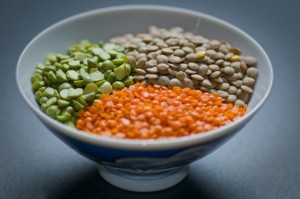Blog post written for Slimsticks.com
Eating a more plant based diet is becoming increasingly popular and the current research is suggesting it’s the way to go. If you don’t want to go the whole “hog” then why not have a few meat free days in your week?
A plant based diet is thought to reduce the risk of several cancers including throat, stomach, colon, prostrate and oesophagus. For example eating too much red meat and processed meat increases your risk of colon cancer. Eating more fruit, vegetables, nuts and seeds leads to a diet lower in fat and calories so can help you lose weight or maintain a healthy weight. A plant based diet is also higher in fibre, antioxidants and phytochemicals, all of which can help prevent disease such as heart disease, type 2 diabetes and cancer.
But eating a more vegetarian diet does mean you need to plan and be a bit organised. Plant based protein foods do not contain the full complement of amino acids which can leave you lacking in protein. Therefore it is important to ensure that you eat a range of different protein foods. Good choices include nuts, fish, seeds, beans, legumes, eggs, cheese, dairy, tofu, quinoa and soya.
Top tips for plant based protein:
- Add seeds to salads and stir fries.
- Top cereals with slivered nuts.
- Experiment with beans, add them to curries, chilli, casseroles and salads.
- Lentils make a great thickened for soups.
- Hummous and nut butters are great at lunchtimes.
- Stock up the freezer with a range of protein sources so you don’t run short.
- Try bean chilli instead of beef chilli or using quorn mince as a minced beef substitute.
- Eggs are fast, fantastic and packed full of protein – omelettes, frittata’s, boiled, scrambled, poached are all healthy options.
